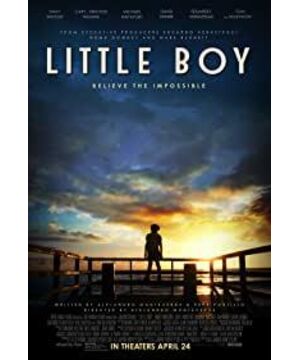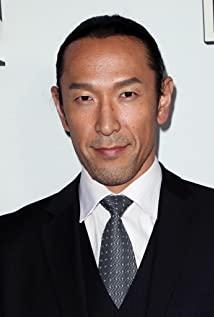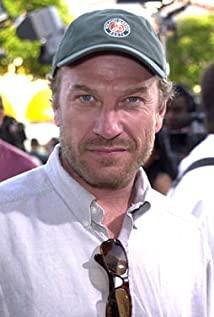War, hatred, reconciliation, and the desire for peace, movies on these themes have produced countless ways of expression. Except for those clumsy ways of directly expressing opinions with the characters' slogan-like lines, many movies have cleverly found small cuts to connect with big events. In many cases, war/anti-war films even turn the war into a narrative background and supporting role. The story of the wartime ordinary life, human encounters and subtle changes in psychology, it is equally or even more touching. . This "Little Boy" is a typical narrative mode of this kind. The story takes place in the fiercest period of World War II, from the Pearl Harbor incident to the United States dropping an atomic bomb on Japan. But those grand events only appeared in the word of mouth of the film characters and the newspapers they read. In this quiet town, people call this 8-year-old "little boy". He has never grown tall, but he is not dwarfism. The doctor gave him this nickname, half helpless and half comforting. He was bullied by his peers, and his father was the only friend. The war is approaching, and because the boy’s brother has flat feet, his father must join the army. Since then, the little boy lives alone, and his only hope is that his father can go home soon. One day, he occasionally heard the priest say that as long as he has a faith the size of a seed, he can move the mountain and fulfill his wish. This sermon made the little boy into a demon, and he felt that he could use his beliefs to get his father back to his side. Seeing all this, the priest wanted to help him, so he made a list of good deeds for him, including providing shelter for homeless people, visiting patients, and so on. Tell him that he has done it all and he will be able to realize his wish. This introverted child began to challenge himself with faith. Looking back at war through children as the protagonist is a clever perspective. Children are the weakest and most arouse universal emotions. Faced with the cruel war machine, their actions and beliefs are even more heartbreaking. What's more ingenious is that the movie sets a mode of rivalry and reconciliation in a closed town in the context of a great war. In this small town, Yamamoto, a Japanese expat who has immigrated for decades, lives. After the Pearl Harbor incident, a large number of Japanese descent were sent to prison for re-identification. Although most of them will be released in the future, it is because they are the two warring parties after all. It is only because of the Japanese face. At this special moment, the Americans in the small town They all regard this Yamamoto as an enemy. This is a universal human emotion, and hatred will dispel reason. In the film, the priest plays a role that transcends human hatred. Seeing all this, he deliberately added a single note for the boy’s good deeds, "Be friends with Yamamoto." This makes the whole film interesting. In order to achieve his higher goals, the child must temporarily cross the psychological barrier. He must convince himself to become friends with this "enemy" in order to achieve a more ultimate goal. After repeated trials, self-denial and final acceptance, the little boy did this step. This process itself is the training of rationality, which allows people's rationality to win and humanity to return. This is also one of the most important themes of the film. The purpose of such films is by no means to incite hatred, but how to transcend humanity to achieve reconciliation. War will cause people to fall into a black and white dichotomy. Even if the opponent is an ordinary citizen of the enemy country, even if it only has the face of the enemy country, they will be summarized into the local camp. When we live outside the battlefield, we are also blindly hated. Shrouded, the consequences may be more terrifying than the war itself. Just like us, the Americans also nicknamed "Jap" for the Japanese who live there, similar to what we call "jap", but in the end, Yamamoto said to the little boy, "I'm not Jap. My name is Jap. Yamamoto." They called each other by names—not codes of hatred. At that moment, the war went to war, the secular went to the secular, and the humanity went to humanity. And this also permeates a more complicated situation. Yamamoto lives alone and the little boy has no father. The time they spend together becomes a reflection of a quasi-father and son. When they sit together and eat ice cream, you will see this picture. Scenery, people from two enemy countries comforted each other at the height of the war. The little boy in this movie has always believed in his superpowers, no matter how many eyes he suffers, he also practices against the sea every day. In the eyes of everyone, that is stupid. In his own heart, that is faith, although he does not. I don't understand this. The nickname "little boy" is a pun. On the one hand, it is derived from the child's height; on the other hand, it is also the code name for the atomic bomb. When the news of the atomic bomb explosion spread throughout the town, people felt that the silly boy who desperately screamed at the sea every day and wanted to end the war with super powers really did. The little boy's father survived. Basically, there will not be too many substantive breakthroughs in the visual presentation of the war itself, but the physical examination from the details of human nature has endless space. There are no slogans in this movie, but everyone will see the meaning of peace. To some extent, it uses the reunion of a family instead of writing the end of the war. War and peace are not grand and remote things, but nothing more than the separation and reunion of families. Regardless of country, human nature is common. (Text/Yang Shiyang)
View more about Little Boy reviews











